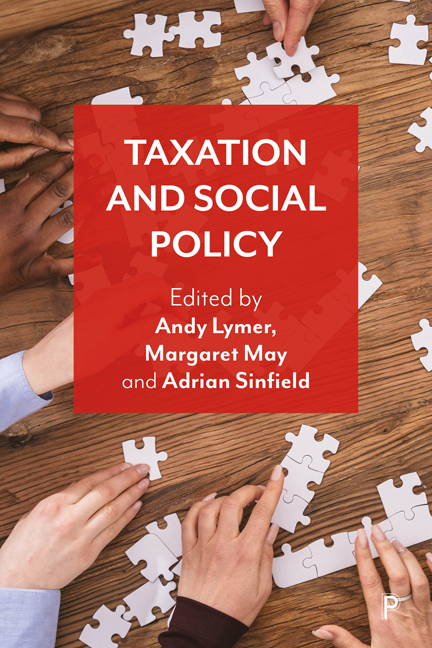Book contents
- Frontmatter
- Contents
- List of figures and tables
- List of abbreviations
- Notes on contributors
- Acknowledgements
- 1 Introduction: The case for considering taxation and social policy togethe
- 2 Fiscal and social policy: two sides of the same coin
- 3 Tax and the social policy landscape
- 4 Fiscal welfare and tax expenditures
- 5 Employment, self-employment and taxation
- 6 Pensions and taxation
- 7 Tax, benefits and household income
- 8 Taxation, health and social care
- 9 Homes, housing and taxation
- 10 Wealth taxation: the case for reform
- 11 Gender and taxation
- 12 Taxation and local taxes
- 13 Corporate tax and corporate welfare
- 14 The climate crisis and taxation
- 15 Conclusions: Taxation in a social policy context
- Index
5 - Employment, self-employment and taxation
Published online by Cambridge University Press: 20 January 2024
- Frontmatter
- Contents
- List of figures and tables
- List of abbreviations
- Notes on contributors
- Acknowledgements
- 1 Introduction: The case for considering taxation and social policy togethe
- 2 Fiscal and social policy: two sides of the same coin
- 3 Tax and the social policy landscape
- 4 Fiscal welfare and tax expenditures
- 5 Employment, self-employment and taxation
- 6 Pensions and taxation
- 7 Tax, benefits and household income
- 8 Taxation, health and social care
- 9 Homes, housing and taxation
- 10 Wealth taxation: the case for reform
- 11 Gender and taxation
- 12 Taxation and local taxes
- 13 Corporate tax and corporate welfare
- 14 The climate crisis and taxation
- 15 Conclusions: Taxation in a social policy context
- Index
Summary
Introduction: perceptions, politics and socio-economic implications
Taxes on income from employment are a substantive source of government revenue, a largely ‘visible’ and hence easily politicised form of taxation, and they have serious implications from a social policy perspective.
First, in the case of the UK, income tax (which is levied on income from employment, some benefits, most pensions, rental income, dividends and interest from savings) and National Insurance contributions (NICs) represent more than 40 per cent of the overall tax revenue of the UK government, well ahead of value added tax (VAT), corporation tax and any other remaining sources of revenue (see Chapter 3).
Second, taxes on employment are directly visible to anyone who is in employment, as deductions are highlighted on each payslip, whereas those who are self-employed receive tax bills on their profits after submitting an annual self-assessment. This is then a form of taxation operating in plain sight, and it is therefore not surprising that income tax and NICs feature prominently in the media coverage of spending reviews and budgets – notably when the impact of tax changes on individuals and households is assessed.
It is equally unsurprising that taxes on employment play a key role in political calculations, with the public perception of changes to personal allowances, thresholds and tax rates being regarded as relevant for a government's future electoral prospects and as indicative of its wider political ideology. A recent illustration of this political salience was the 2022 Spring Statement, at which the then Chancellor of the Exchequer, Rishi Sunak, found it politically useful to announce a planned future decrease of the standard income tax rate to create a counterpoint to an immediate increase in NICs, thus seeking to address the need for additional government revenue while being seen as committed to lower taxation – even though the potential gains of this future tax cut for households would be marginal in comparison to increased costs of living and higher NI payments.
- Type
- Chapter
- Information
- Taxation and Social Policy , pp. 67 - 86Publisher: Bristol University PressPrint publication year: 2023



